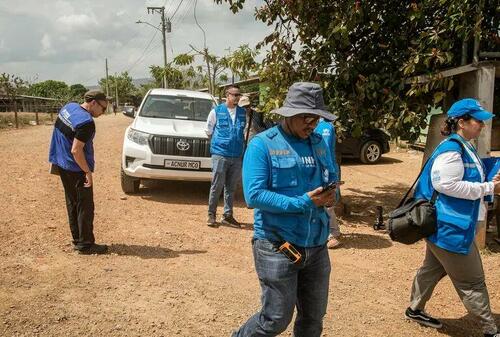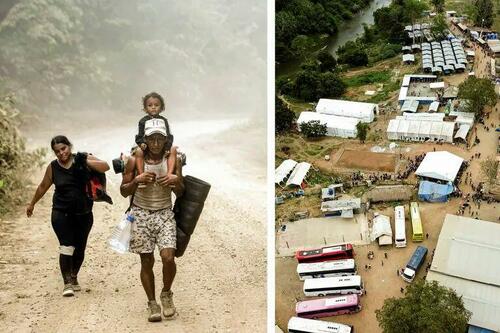
Authored by Darlene McCormick Sanchez via The Epoch Times (emphasis ours),
The ripe smell of garbage baking in the tropical sun mixed with the stench of human waste is one of the first things visitors notice at Bajo Chiquito, one of four large migrant camps in the Darién Gap.

The next is a sea of weary migrants, who hiked from Colombia along the infamous jungle trail, lined up to be processed by Panamanian officials.
One young boy in line with a furrowed brow seems worried. Others stare blankly at ramshackle buildings slapped together with wood, tin, and cinder blocks. They wait patiently in the brutal heat and humidity.
Most of them are coming to the United States aided by the United Nations, its nongovernmental partners, and regimes hostile to the United States.
Experts have said the migrants are being used as a weapon, just as deadly as a missile aimed straight at the United States.
Mass migration is being “weaponized” to overwhelm and destabilize the United States and ultimately break it apart, according to Joseph Humire, who studies unconventional warfare and is the executive director of the Center for a Secure Free Society.
“That’s why I think the term ‘invasion’ is appropriate,” Mr. Humire told The Epoch Times.
Migrant Pawns
Last year, a record 500,000 migrants traveled through the Darién Gap, documents show.
In February, The Epoch Times visited all four migrant camps in Panama: Lajas Blancas, Bajo Chiquito, San Vicente, and Canaán Membrillo.

The United Nations and related nongovernmental organizations (NGOs), which receive millions of U.S. taxpayer dollars, have made mass migration easier by facilitating and augmenting migrant movement with food, shelter, and water.
Reporters spoke with migrants from China, Somalia, Venezuela, Ecuador, and Colombia and others who hiked out of the treacherous jungle leading from Colombia into Panama.
Many at the camps suffered from injuries and illnesses such as trench foot and broken limbs. Several complained that the water was untreated at the camps run by the NGOs and that they lacked essential items such as diapers. One migrant told The Epoch Times that food supplied at the camps was stale or spoiled, so he spent $7 to buy a meal from a local vendor.
Others said they were stranded at the camps because they were robbed during their journey or couldn’t pay the $60 needed for the bus ride north.

The number of illegal immigrants entering the United States has surged under the Biden administration as policies from the Trump era have been reversed or eliminated.
Illegal immigrant encounters at U.S. borders in fiscal 2022 totaled more than 2.7 million nationwide, according to CBP data.
By 2023, that number topped 3.2 million.
The numbers also correspond with President Joe Biden’s renewed pledge to support the U.N.’s Global Compact for Safe, Orderly, and Regular Migration—a 2018 plan to manage global migration that was approved by 152 nations.
“The Biden–Harris Administration is committed to safe, orderly, and humane migration around the world, including to the United States,” a government statement in December 2021 read. The United States had voted against the compact under President Donald Trump.
Most migrants are oblivious to their role as human ammunition, according to Trevor Loudon, an expert on communist regimes and host of EpochTV’s “Counterpunch.”
The U.N. and NGO workers at the City of Knowledge in Panama—which was once part of the U.S. military base given to Panama—have exposed migrants to violence, injury, death, and disease, he said.
“These bureaucrats with fat salaries, eating at nice local restaurants, are having a great old time facilitating one of the biggest crimes against humanity that’s ever been perpetrated,” Mr. Loudon said.
Panama’s former border director Oriel Ortega told The Epoch Times the NGOs should be educating and helping migrants in their own countries instead of facilitating migration.
The Epoch Times knocked on multiple U.N. agency doors at the City of Knowledge complex while in Panama in an unsuccessful attempt to interview officials with the U.N. and HIAS, founded as the Hebrew Immigrant Aid Society.
At one U.N. office, reporters could see workers through blinds scrambling to hide after The Epoch Times knocked and rang the doorbell repeatedly.
Migrants said the trek through dense rainforest, steep mountains, thick mud, and swamps was exhausting and dangerous.
They told stories of murder, rape, and desperation.
Estimates of deaths reported by NGOs are probably low. The American Red Cross reported that 60 people died crossing the Darién Gap during the first half of 2023, but anecdotal information from people who have been in the jungle put that number in the hundreds or thousands each year.
Michael Yon, a war correspondent who has been reporting on the flood of migrants moving through the jungle into Panama, told The Epoch Times he estimates that about 1 percent of those making the journey die.
At the Bajo Chiquito camp on Feb. 18, one Venezuelan migrant sitting under the shade of a tin roof shelter counted himself as lucky.
He was only robbed during the journey through the Darién Gap that he described as “hell” through an interpreter.
He witnessed a man who was stoned and then shot in the head for trying to protect his wife from being gang raped, he said.
“He went to go defend the girl,” he said.
Close by, a Venezuelan woman, Fabiola Suarez, appeared despondent. She had hiked through the Darién Gap to reunite with her husband in Colorado.

She, too, counted herself as lucky.
She was almost raped by criminals preying on migrants, but there were enough people in her group to stave off an attack, she said.
“There was a lot in the group, so they didn’t,” she said through an interpreter.
Dripping with sweat, Gustavo Toala emerged from the Darién jungle trail on Feb. 17 with only the clothes on his back—and a cellphone in his hand.
Everyone had cellphones, a lifeline for many at the camps.
He and two companions from Ecuador trudged over a rudimentary bridge into Lajas Blancas camp, looking exhausted after a five-hour walk from camp Bajo Chiquito.
Mr. Toala said through an interpreter that he and his two companions started as a group of 12, but they got separated during the journey.
He had been traveling for almost two weeks, hoping for a better life in the United States.
He left because of the high crime rate in Ecuador and the inability of small business owners to make a living due to extortion, he said.
With no map and little water, he blindly followed other migrants through the Darién Gap, where robbery, rape, and death await many.
He hoped to catch a bus to Costa Rica next.
At Lajas Blancas, migrants have access to a number of large maps provided by NGOs that display detailed migration routes heading to the United States.
One map is from HIAS, which recently received $11 million from the U.S. in two grants awarded specifically to go to Latin American migrants.
One HIAS map shows the migration route from Colombia to Costa Rica, including detailed bus stops, temperatures, altitudes, and “migration kiosk” locations.
Read more here...
Authored by Darlene McCormick Sanchez via The Epoch Times (emphasis ours),
The ripe smell of garbage baking in the tropical sun mixed with the stench of human waste is one of the first things visitors notice at Bajo Chiquito, one of four large migrant camps in the Darién Gap.

The next is a sea of weary migrants, who hiked from Colombia along the infamous jungle trail, lined up to be processed by Panamanian officials.
One young boy in line with a furrowed brow seems worried. Others stare blankly at ramshackle buildings slapped together with wood, tin, and cinder blocks. They wait patiently in the brutal heat and humidity.
Most of them are coming to the United States aided by the United Nations, its nongovernmental partners, and regimes hostile to the United States.
Experts have said the migrants are being used as a weapon, just as deadly as a missile aimed straight at the United States.
Mass migration is being “weaponized” to overwhelm and destabilize the United States and ultimately break it apart, according to Joseph Humire, who studies unconventional warfare and is the executive director of the Center for a Secure Free Society.
“That’s why I think the term ‘invasion’ is appropriate,” Mr. Humire told The Epoch Times.
Migrant Pawns
Last year, a record 500,000 migrants traveled through the Darién Gap, documents show.
In February, The Epoch Times visited all four migrant camps in Panama: Lajas Blancas, Bajo Chiquito, San Vicente, and Canaán Membrillo.

The United Nations and related nongovernmental organizations (NGOs), which receive millions of U.S. taxpayer dollars, have made mass migration easier by facilitating and augmenting migrant movement with food, shelter, and water.
Reporters spoke with migrants from China, Somalia, Venezuela, Ecuador, and Colombia and others who hiked out of the treacherous jungle leading from Colombia into Panama.
Many at the camps suffered from injuries and illnesses such as trench foot and broken limbs. Several complained that the water was untreated at the camps run by the NGOs and that they lacked essential items such as diapers. One migrant told The Epoch Times that food supplied at the camps was stale or spoiled, so he spent $7 to buy a meal from a local vendor.
Others said they were stranded at the camps because they were robbed during their journey or couldn’t pay the $60 needed for the bus ride north.

The number of illegal immigrants entering the United States has surged under the Biden administration as policies from the Trump era have been reversed or eliminated.
Illegal immigrant encounters at U.S. borders in fiscal 2022 totaled more than 2.7 million nationwide, according to CBP data.
By 2023, that number topped 3.2 million.
The numbers also correspond with President Joe Biden’s renewed pledge to support the U.N.’s Global Compact for Safe, Orderly, and Regular Migration—a 2018 plan to manage global migration that was approved by 152 nations.
“The Biden–Harris Administration is committed to safe, orderly, and humane migration around the world, including to the United States,” a government statement in December 2021 read. The United States had voted against the compact under President Donald Trump.
Most migrants are oblivious to their role as human ammunition, according to Trevor Loudon, an expert on communist regimes and host of EpochTV’s “Counterpunch.”
The U.N. and NGO workers at the City of Knowledge in Panama—which was once part of the U.S. military base given to Panama—have exposed migrants to violence, injury, death, and disease, he said.
“These bureaucrats with fat salaries, eating at nice local restaurants, are having a great old time facilitating one of the biggest crimes against humanity that’s ever been perpetrated,” Mr. Loudon said.
Panama’s former border director Oriel Ortega told The Epoch Times the NGOs should be educating and helping migrants in their own countries instead of facilitating migration.
The Epoch Times knocked on multiple U.N. agency doors at the City of Knowledge complex while in Panama in an unsuccessful attempt to interview officials with the U.N. and HIAS, founded as the Hebrew Immigrant Aid Society.
At one U.N. office, reporters could see workers through blinds scrambling to hide after The Epoch Times knocked and rang the doorbell repeatedly.
Migrants said the trek through dense rainforest, steep mountains, thick mud, and swamps was exhausting and dangerous.
They told stories of murder, rape, and desperation.
Estimates of deaths reported by NGOs are probably low. The American Red Cross reported that 60 people died crossing the Darién Gap during the first half of 2023, but anecdotal information from people who have been in the jungle put that number in the hundreds or thousands each year.
Michael Yon, a war correspondent who has been reporting on the flood of migrants moving through the jungle into Panama, told The Epoch Times he estimates that about 1 percent of those making the journey die.
At the Bajo Chiquito camp on Feb. 18, one Venezuelan migrant sitting under the shade of a tin roof shelter counted himself as lucky.
He was only robbed during the journey through the Darién Gap that he described as “hell” through an interpreter.
He witnessed a man who was stoned and then shot in the head for trying to protect his wife from being gang raped, he said.
“He went to go defend the girl,” he said.
Close by, a Venezuelan woman, Fabiola Suarez, appeared despondent. She had hiked through the Darién Gap to reunite with her husband in Colorado.

She, too, counted herself as lucky.
She was almost raped by criminals preying on migrants, but there were enough people in her group to stave off an attack, she said.
“There was a lot in the group, so they didn’t,” she said through an interpreter.
Dripping with sweat, Gustavo Toala emerged from the Darién jungle trail on Feb. 17 with only the clothes on his back—and a cellphone in his hand.
Everyone had cellphones, a lifeline for many at the camps.
He and two companions from Ecuador trudged over a rudimentary bridge into Lajas Blancas camp, looking exhausted after a five-hour walk from camp Bajo Chiquito.
Mr. Toala said through an interpreter that he and his two companions started as a group of 12, but they got separated during the journey.
He had been traveling for almost two weeks, hoping for a better life in the United States.
He left because of the high crime rate in Ecuador and the inability of small business owners to make a living due to extortion, he said.
With no map and little water, he blindly followed other migrants through the Darién Gap, where robbery, rape, and death await many.
He hoped to catch a bus to Costa Rica next.
At Lajas Blancas, migrants have access to a number of large maps provided by NGOs that display detailed migration routes heading to the United States.
One map is from HIAS, which recently received $11 million from the U.S. in two grants awarded specifically to go to Latin American migrants.
One HIAS map shows the migration route from Colombia to Costa Rica, including detailed bus stops, temperatures, altitudes, and “migration kiosk” locations.
Read more here…
Loading…




